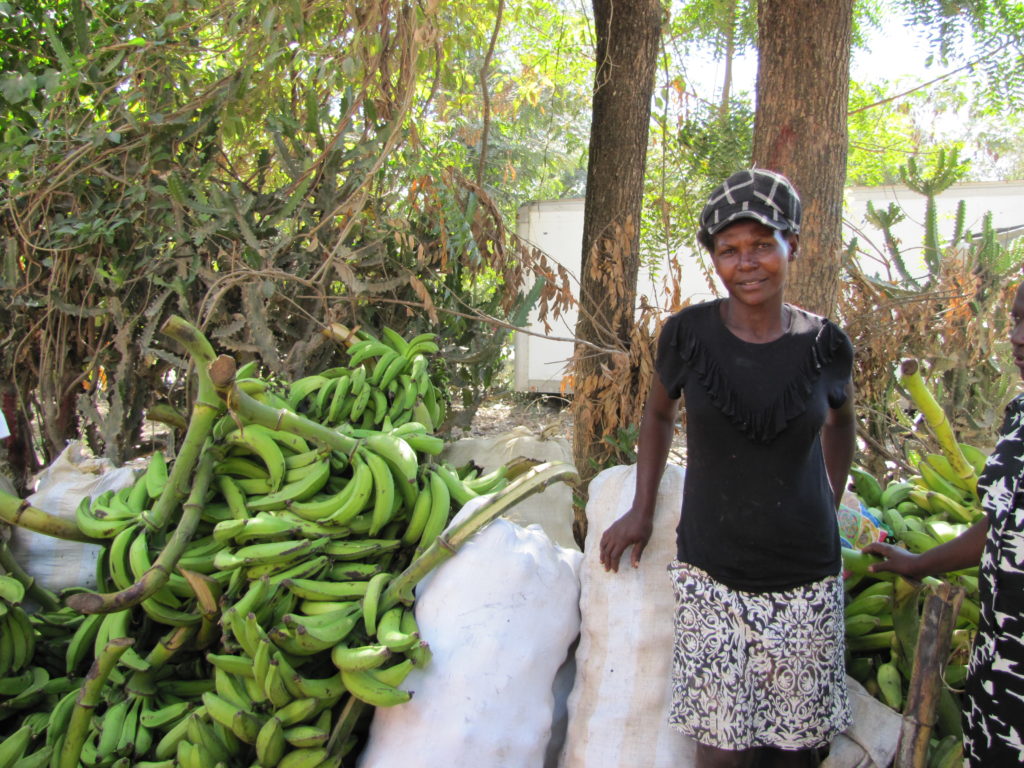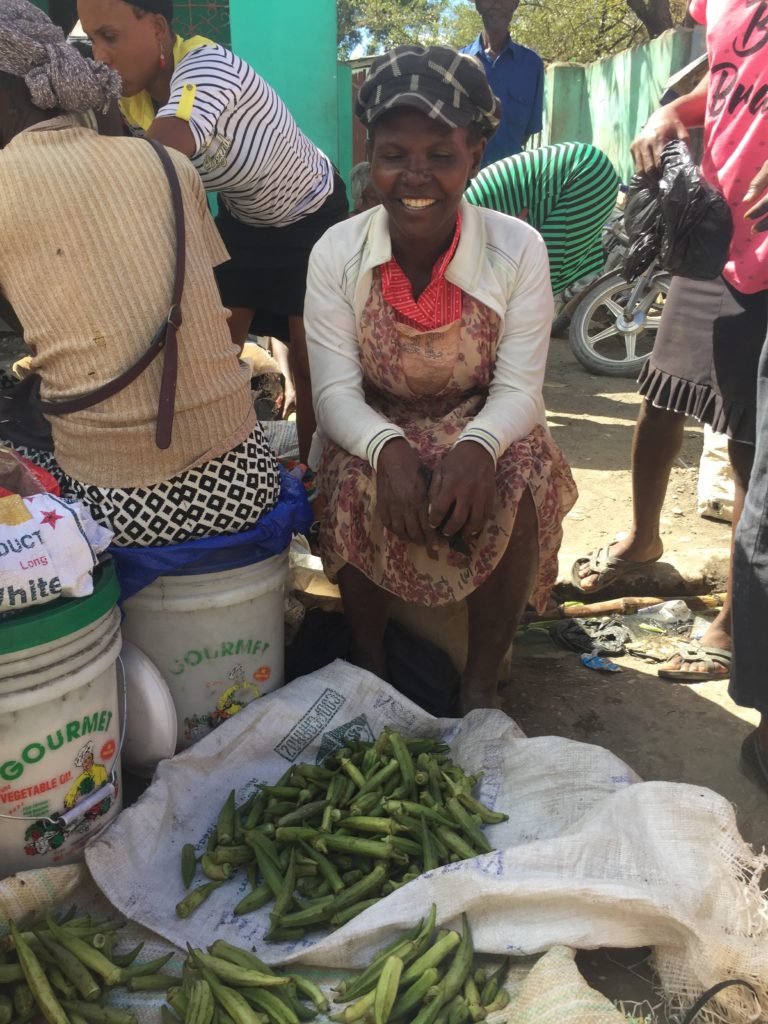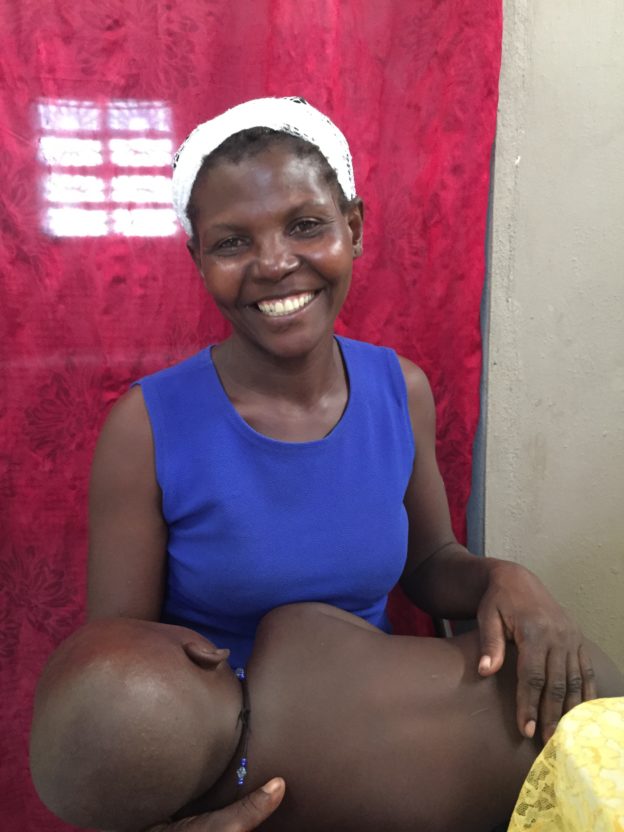When the CLM team first met Marie Maude, she could hardly have been poorer than she was. A single mother, she was raising seven young children by herself. Her first husband died, leaving her with their five kids. She then had two more with a second man. But when she saw that he wasn’t willing to do his share of work to help the family, she split from him. At the time she joined the program, she was living with her kids in a house that someone was simply letting her use. She would wait for neighbors, family members, or friends to come by with gifts of food or money. When no one gave them anything, she and her children would have to do without.
Things took a turn for the worse when the home’s owner sold it out from under her, informing her that she would have to leave quickly. She collected and nailed together a couple of support posts, and began weaving together palm leaves to make the walls. A group of visitors whom CLM staff brought out into the field was so distraught when they met her that they immediately pitched in to buy her enough tarpaulins to provide good, temporary cover for the roof and the walls.
She chose goat-rearing and peanut-farming as her two activities. The goat-rearing developed slowly. The CLM team’s struggles to purchase livestock for her cohort meant that the goats she received were too small to reproduce right away. She used savings from her weekly stipend and earnings from her first peanut harvest to buy another goat, but it died. When one of the three that Fonkoze gave her finally had a kid, the kid died. Now, finally, another one of her CLM goats in pregnant.
Her first crop of peanuts was profitable, but a drought through the summer meant that the second crop was small. When she sold it, she used as much as she needed to pay her children’s school tuition. Then she took the rest of the money, and bought more peanuts to sell. But when she left the market, she had less money than she started with. She had to change her approach.
And then she was presented with an opportunity she hadn’t anticipated. A large, US-based organization decided to build a small community of homes close to where she lived. These homes would be much more substantial than anything she could have managed with the support that CLM was offering. The organization was building solid, four-room houses with a kitchen and a bathroom, investing thousands of dollars per family.
It was an opportunity she couldn’t miss, but it wasn’t easy to qualify for one of the homes. She needed to hand over ownership of a plot of land to the organization, something she couldn’t do without legal title to land. She had begun to purchase a small plot in better days, but had never been able to pay off the balance. She needed more cash than she could muster to complete the purchase. So, she took out a 5000-gourd loan from her Village Savings and Loan Association, and got the title.
But that loan created additional challenges. On one hand, she’d need a steady income to repay it on time. On the other, she had counted on just such a loan to get a small commerce started.
She was eventually able to establish a business when a friend offered to take out a 15,000-gourd loan in her own name from a local microfinance institution. She gave the money to Marie Maude. She asked nothing for herself, only requiring that Marie Maude pay back the loan and all the interest on time. Marie Maude was both excited and surprised. “Before I was part of CLM, no one would have lent me 50 gourds. They could see that I wouldn’t be able to pay. Now they see my goats and they see me saving every week, and they know I can.”
She invested the money in a highly profitable bean business. But the way she buys the beans at an especially low price means that she can’t buy them very often. She earns regular, but not frequent, lumps of cash. She felt she needed another business that would produce a steadier income stream.
So, she took 5000 gourds from her bean-business’s profit and started two separate activities. Haitians call one “bese leve” and the other “kase lote.” On Mondays, she goes to the large market in Kas and buys produce from farmers by the sack. She might buy sour oranges or avocados – whatever is in season – or she might just buy plantains. When she has enough, she sells the whole load to a Madan Sara. That’s what Haitians call the market women who buy up produce in the countryside and bring it by truck for sale in Pòtoprens. This business is an example of bese leve, which means “bend down and lift.” You bend down to pick up small loads of produce and lift them into the truck the madan sara uses to ship them to the capital.

After completing the sale, she takes the money and buys again, but this time it’s kase lote. That means “break it up and put it in piles.” It’s a name for buying produce wholesale and selling it retail. Marie Maude buys okra, tomatoes, and other vegetables. She sells these retail in the market in Ench on Tuesday and Wednesday. On Thursdays, she goes to the market in Tomond, where she does the same thing she does in Kas, selling the vegetables she buys in Ench on Saturday. It’s a lot of work, a lot of running around.

But she’s succeeding beyond anything she could have imagined. Her children now eat three meals every day, and all seven are in school. She’s sold one of her goats in preparation for purchasing a cow, and she’s confident she’ll be able to repay her loan when it becomes due in April. “The program taught me to manage what I have. I used to spend everything that came into my hands. I’ve learned that I have to save, too.”
And she’s excited about the turn her life has taken. As I take her picture, she is quick to quip, “I have to smile, because people need to see how happy I am.”

Great, Steve! This woman needs to get further entrepreneurship training IMMEDIATELY so she can continue to grow her businesses. She’s got everything it takes: intelligence, determination, and energy. Maybe she should graduate early and move on to something bigger with the appropriate support from a coach.